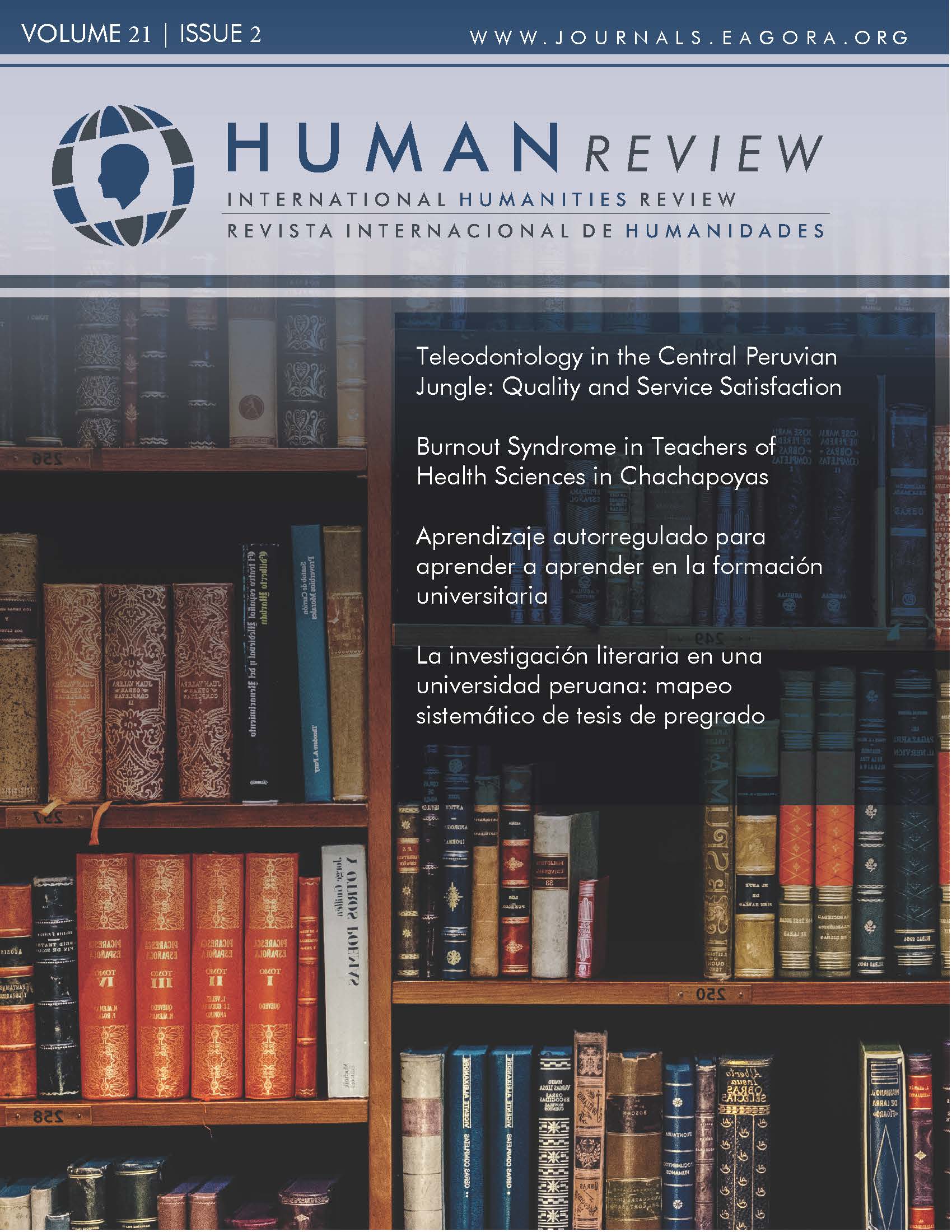Art in Professional Training in Primary Education: Assessment and Curricular Challenges
DOI:
https://doi.org/10.37467/revhuman.v21.5072Keywords:
Art, Comprehensive training, Graduation profile, Artistic skills, Soft skillsAbstract
The article is the product of a study with a mixed approach whose purpose was to analyze and understand the value of art in professional training in Education, based on the opinions of students, and the curricular challenges around art that innovations imply. The sample consisted of Primary Education students from a National University of Lima and to collect information on the appreciation of art in teacher training, a closed questionnaire of attitudes towards artistic expression activities in professional training in Education and for students was applied. curricular challenges an open questionnaire was administered. The results reflect a significant value assigned to art in teacher training and the need and importance of including art as a longitudinal area in the curriculum so that it contributes to the formation of artistic competences and soft skills of future teachers at the Education level. Primary, those that are essential in the teaching.
References
Allende Joaquín, D. (2022). Desarrollo de competencias artísticas mediante talleres creativos y apreciación arqueológico en estudiantes de secundaria en la institución educativa “Tomas Paullo Sulca”, Tambillo, Huamanga, 2021 [Tesis de maestro, Universidad Nacional San Cristóbal de Huamanga]. http://repositorio.unsch.edu.pe/handle/UNSCH/5331
Altamirano Julca, Y. (2019). Neurociencia de la educación y creatividad. San Marcos.
Altamirano Julca, Y. (2023). Las inteligencias artísticas: nuevas estructuras de la mente. San Marcos.
Azoulay, A. (2020). Mensaje de la Sra. Audrey Azoulay, directora general de la UNESCO, con motivo de la Semana Internacional de la Educación Artística; 25-31 de mayo de 2020. https://unesdoc.unesco.org/ark:/48223/pf0000373516_spa
Blanco Pérez, A. (2020). La importancia de las artes en la educación de la nación y el individuo. Debates por la historia, 8(8), pp. 17-40. https://www.redalyc.org/journal/6557/655769220002/655769220002.pdf DOI: https://doi.org/10.54167/debates-por-la-historia.v8i1.426
Briceño Pizarro, Y. y Carro Salas, R. (2005). El arte en los Estudios Generales de la UNED. Espiga, 6(12), 37-44. https://doi.org/10.22458/re.v6i12.1075 DOI: https://doi.org/10.22458/re.v6i12.1075
Cruz-Aguilar, R., Meregildo-Gómez, M., Esquivel-Grados, J., Venegas-Mejía, V., Esquivel-Grados, M., (2021). Investigación educativa en la práctica docente. Conocer la realidad desde el saber hacer. Editorial Grupo Compás. http://142.93.18.15:8080/jspui/bitstream/123456789/717/1/listo.pdf
Cuda, M. (2018). Neurociencia, didáctica y Pedagogía. Bonum.
Damasio, A. (2019). Y el cerebro creó al hombre. Paidós Ibérica.
Diez del Corral, P. (2005). Una nueva mirada a la Educación Artística desde el Paradigma del Desarrollo Humano [Tesis doctoral, Universidad Complutense de Madrid]. https://webs.ucm.es/BUCM/tesis/bba/ucm-t28786.pdf
Fandiño, J. (2004). El arte y la educación superior. Educación y Educadores, (7), 229-235. http://www.redalyc.org/articulo.oa?id=83400716
Fernández, S. y Chavero, G. (2012). Las competencias artísticas en la enseñanza del arte. Decires, Revista del Centro de Enseñanza para Extranjeros, 14(17), 9-58. https://www.unipamplona.edu.co/unipamplona/portalIG/home_9/recursos/general/22052015/las_competencias_artisticas_en.pdf DOI: https://doi.org/10.22201/cepe.14059134e.2012.14.17.249
Gama Castro, M. M., León Reyes, F. y Bahamón Cardona, C. A. (2014). Inclusión de la Educación Artística en el currículo de formación profesional. Praxis, (10), 176-188. https://www.researchgate.net/publication/305852110 DOI: https://doi.org/10.21676/23897856.1368
Gardner, H. (2001). Arte, mente y cerebro. Una aproximación cognitiva a la creatividad. Paidós Ibérica.
Gardner, H. (2010). Educación artística y desarrollo humano. Paidós Ibérica.
Hermann, A. (2009). El arte en la educación, en búsqueda de un nuevo epístema educativo. Shopia, Colección de Filosofía de la Educación, 6, 167-180. https://www.redalyc.org/pdf/4418/441846107009.pdf DOI: https://doi.org/10.17163/soph.n6.2009.08
Hernández-Sampieri, R. y Mendoza Torres, C. P. (2018). Metodología de la Investigación. Las rutas cuantitativa, cualitativa y mixta. McGraw-Hill Educación.
Jiménez, C. (2011). La importancia de la Educación Artística en la formación integral del alumno. [Tesis de Licenciatura, Universidad Pedagógica Nacional]. http://200.23.113.51/pdf/28845.pdf
Katayama Omura, R. J. (2014). Introducción a la Investigación Cualitativa: Fundamentos, métodos, estrategias y técnicas. Fondo editorial UIGV.
Palacios, L. (2019). El valor del arte en el proceso educativo. Reencuentro, (46), 36-44. https://reencuentro.xoc.uam.mx/index.php/reencuentro/article/view/578/578
Pérez Expósito, L. (2006). La educación musical y el aprendizaje de la diversidad cultural. Reencuentro, (46). https://reencuentro.xoc.uam.mx/index.php/reencuentro/article/view/579/579
Torres García, O. (2013). La educación a través del arte como instrumento básico de la enseñanza superior: comparativa y validación del Test Crea como recurso evaluador en alumnos universitarios [Tesis doctoral, Universidad Autónoma de Madrid]. https://repositorio.uam.es/bitstream/handle/10486/13494/63439_torres%20garcia%20oscar%20eduardo.pdf?sequence=1
Torres Pellicer, S. (2020). Los enfoques pedagógicos presentes en la Educación Artística. Trayectoria: Práctica Docente en Educación Artística, (7), 66-87.
Velázquez Hernández, J. A., Rivera Aguilar, R. y Romero Zepeda, M. (2023). La unión entre las artes y la educación universitaria, un cambio en el aprendizaje. Ciencia Latina, 7(1), 9348-9364. https://ciencialatina.org/index.php/cienciala/article/view/5062 DOI: https://doi.org/10.37811/cl_rcm.v7i1.5062
Yáñez Galleguillos, L. M. (2020). Competencias genéricas en la educación universitaria: una propuesta didáctica. Revista Educación Las Américas, 10(2), 168-184. http://portal.amelica.org/ameli/jatsRepo/248/2481629002/html/ DOI: https://doi.org/10.35811/rea.v10i2.102
Downloads
Published
How to Cite
Issue
Section
License
Those authors who publish in this journal accept the following terms:
- Authors will keep the moral right of the work and they will transfer the commercial rights.
- After 1 year from publication, the work shall thereafter be open access online on our website, but will retain copyright.
- In the event that the authors wish to assign an Creative Commons (CC) license, they may request it by writing to publishing@eagora.org









